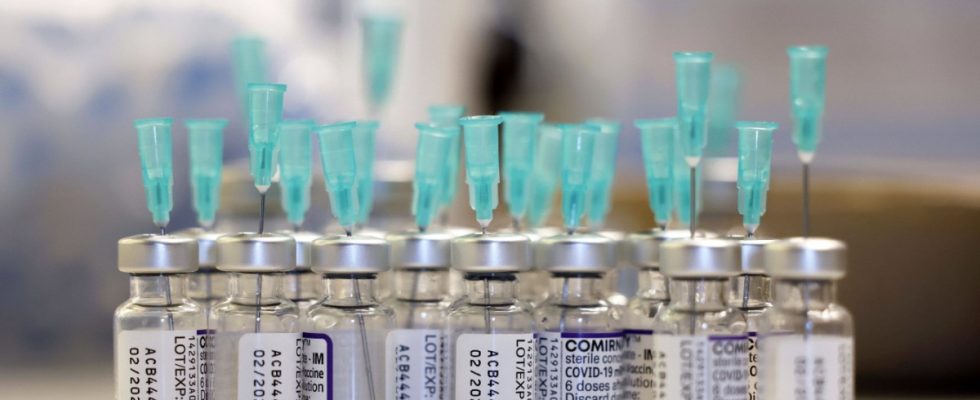According to a study, vaccines against the coronavirus with mRNA technology can lead to the formation of unintended proteins in the body of the vaccinated person to a small extent. That sounds worrying; However, so far there is no evidence that this has had negative effects, Researchers led by biochemist Anne Willis from the British University of Cambridge write in the science journal Nature. The group still recommends that future vaccine development try to avoid this phenomenon. Theoretically, the unwanted proteins could reduce the effectiveness of the vaccines or cause unwanted side effects.
German experts speak of interesting results, but see no reason to worry. “The effect described, if true, is not dangerous or worrying and most likely has nothing to do with general vaccination reactions or with the side effects of mRNA vaccines,” says Julian Schulze zur Wiesch. He is senior physician in the infectious disease section and head of the outpatient center for viral hepatology at the University Hospital Hamburg-Eppendorf. Overall, the mRNA vaccines are safe. His colleague Marina Rodnina from the Max Planck Institute for Multidisciplinary Natural Sciences in Göttingen sees it similarly: There is currently no evidence that such protein pieces produced by vaccination are associated with undesirable effects in humans. However, if production can be adjusted to avoid the phenomenon, “this should definitely happen for the future use of mRNA technology.”
“Research has shown beyond doubt that the mRNA vaccination against Covid-19 is safe.”
mRNA vaccines contain the genetic instructions for a component of the virus against which humans are to be protected. In the case of the corona vaccines, there are biochemical building instructions for a protein on the surfaces of the Sars-CoV-2 viruses that the pathogens use to seek contact with the cells of their victims. According to this blueprint, the body’s cells temporarily produce the virus protein, which puts the body’s immune system on alert before it has come into contact with the pathogen. During this production process, the cell’s molecular machines read the genetic blueprint of the mRNA in steps of three. Three mRNA building blocks each provide instructions as to which amino acid building block should be incorporated next into the protein that is currently being created. If this so-called reading frame shifts by just one mRNA building block, the cell builds different amino acids into the protein than those prescribed by the blueprint. Production often stops as a result.
Willis’ group has discovered that such reading frame shifts can also occur in rare cases and only in individual building blocks of the mRNA when reading the mRNA vaccines. However, there is no evidence of any harmful effects of the new proteins. The team blames this on a chemical modification of the mRNA used, for example, in the vaccines from Moderna and Pfizer. This change to the biomolecule makes the vaccine both more tolerable and more effective. For this discovery, the Nobel Prize in Medicine was recently awarded to Katalin Karikó from Hungary and to the US biochemist Drew Weissman.
The experiments by Willis and colleagues not only showed that the cell machinery can occasionally stumble as a result of this modification, but also how this can be prevented. To do this, the group redesigned the mRNA molecules without the six stumbling blocks identified in the vaccine examined, so that they deliver the correct blueprint for the desired protein in the cells, but reading frame shifts occur less frequently. “Research has shown beyond doubt that the mRNA vaccination against Covid-19 is safe. Billions of doses of the mRNA vaccines from Moderna and Pfizer have been administered safely and have saved lives worldwide,” James Thaventhiran, who works in, is quoted as saying in a press release same department as Anne Willis. “We have to ensure that the mRNA vaccines are just as reliable in the future.” He sees the development of a “stumbling-free” vaccine RNA as an important contribution to this. “We can remove the error-prone code from the mRNA in vaccines so that the body makes the proteins we need for an immune response without accidentally making other proteins too.”
The molecular biologist Marina Rodnina from Göttingen points out that the strategy of her colleagues from Cambridge could influence the effectiveness of the vaccines. But of course all of these strategies should be “carefully examined and tested in future experiments.” She also emphasizes that she considers the frequency of reading frame shifts to be very low. “I would even say that it is close to natural probability.” However, it cannot be ruled out that the undesirable by-products lead to undesirable effects in very rare cases or other applications.
The molecular biologist Rolf Marschalek from the Goethe University in Frankfurt told the science journal Science, he would like to see more evidence before being convinced that frameshifts in modified mRNAs are a relevant problem. He sees no reason to worry about the safety of the mRNA corona vaccines in the new work. It is, he says, “a much bigger problem that the omicron variant is underestimated and people are not receiving the current booster vaccination.”
With material from the Science Media Center

